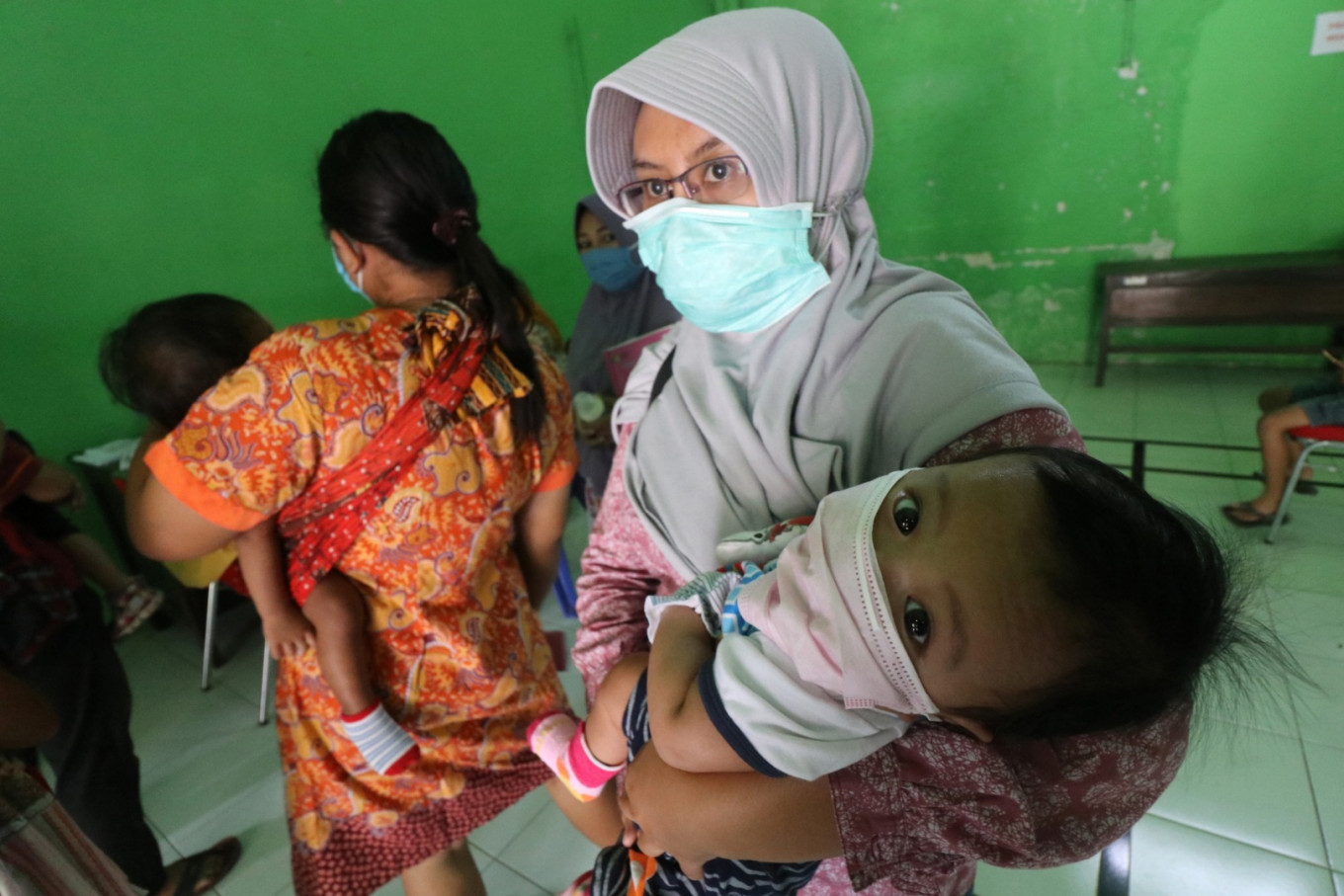Popular Reads
Top Results
Can't find what you're looking for?
View all search resultsPopular Reads
Top Results
Can't find what you're looking for?
View all search resultsGovernment drives childhood vaccinations amid pandemic
The government and health experts are both urging parents to get their children vaccinated as scheduled in a concerted effort against the reemergence of vaccine-preventable childhood diseases during the COVID-19 health crisis.
Change text size
Gift Premium Articles
to Anyone
J
ust as the COVID-19 pandemic began to emerge in January, 21-year-old Dian gave birth to her premature son in Tuban, East Java, which is now the epicenter of the Indonesian outbreak.
The new mother said she had grown increasingly worried about her baby’s health, not only because of the new virus, but also the risk other childhood diseases pose if her son did not complete his immunization schedule.
The epidemic has forced many Posyandu (integrated health services posts) in Tuban to temporarily suspend their services, just like in many other regions in the country. Posyandu are a vital part of the public health system in that they offer free primary immunizations for infants and children.
"From the beginning, I didn't get any confirmation as to when [the Posyandu] would reopen,” Dian told The Jakarta Post. “So in June, I went to see a pediatrician and get my son vaccinated. I had to pay Rp 450,000 [US$30.60], which was quite a big sum for me; but I'd do anything for my son's health,” she said.
The cost is about a quarter of Dian’s husband's monthly income of Rp 1.9 million.
Her son got his Bacillus Calmette-Guèrin (BCG) vaccine for tuberculosis (TB) and his polio vaccine at 4 months old, much later than the ideal inoculation age of 2 months. Now that the local Posyandu had reopened, Dian said that her son had been scheduled to receive his diphtheria, pertussis and tetanus shots soon.
The government and experts alike share Dian’s concern that Indonesian children, who account for 30 percent of the population, could be at risk of other outbreaks from vaccine-preventable diseases (VPDs) as the epidemic disrupts routine immunization across the country.
With the support of UNICEF, the Health Ministry's evaluation on 5,329 of the country's 9,993 Puskesmas (community health centers) from April 20 to 29 found that nearly 84 percent of the surveyed facilities had reported disruptions to their immunization programs.
Some Puskesmas and Posyandu have limited or suspended their services during the public health crisis, while some have remained open. But parents have reportedly avoided visiting the facilities over their fears of contracting COVID-19.
This has only added to the problems already plaguing immunization programs, with anti-vaccine stances fueled by concerns over the vaccines' halal status as well as potential side effects.
The 2017 Health Ministry regulation on immunization stipulates that children aged below 1 year be given basic vaccines, including against hepatitis B, polio, TB, diphtheria, pertussis, tetanus, measles, pneumonia and meningococcal disease (bacterial meningitis).
Ministry data shows that January and February 2020 recorded a year-on-year (yoy) increase in the coverage rate of the complete immunization schedule for basic vaccines compared to 2019.
However, the opposite occurred in March and April, the first two months of the COVID-19 outbreak in Indonesia. The ministry recorded a 4.9 percent yoy decline in the March coverage rate and a staggering 26.2 percent yoy decline in April.
"Where are these [children]? Reaching them requires us all to work together," the ministry's surveillance and quarantine director, Vensya Sitohang, said at a public discussion in June. "There shouldn't be a second wave [...] of the COVID-10 pandemic [and] vaccine-preventable diseases."
Meanwhile, the School Children Immunization Month (BIAS) program for booster shots of the diphtheria, tetanus and measles vaccines are to resume once elementary schools reopen.
Indonesian Pediatric Society (IDAI) spokesperson Hartono Gunardi warned that disruptions to immunization programs could give rise to a "double epidemic" with the resurgence of VPDs such as measles and diphtheria.
Vaccine coverage must reach 95 percent to achieve herd immunity.
The Health Ministry said that the national coverage rate for the full course of basic childhood vaccines was 93.7 percent in 2019, slightly higher than the target of 93 percent coverage per annum.
However, last year also saw uneven distribution of vaccine coverage with below 60 percent coverage in the single province of Aceh and between 60 and 80 percent coverage in seven other provinces.
A breakdown of the national coverage rate also shows that 40 regencies and cities had less than 60 percent coverage and 96 regencies and cities had a coverage rate of 60 to 80 percent.
Catharine Mayung Sambo of the IDAI urged health workers to plan proactively to deliver a "catch-up" vaccination program for children who had fallen behind in their immunization schedule. She added that these children should be vaccinated as soon as possible, even if it meant getting their vaccines later than the recommended age.
"But it must be taken into account that there are vaccines that must be given on schedule, such as the hepatitis B [vaccine] at birth and the BCG [vaccine] within the three months since birth," she said, noting that other vaccines such for polio, diphtheria, pertussis, tetanus and measles had "their own schedules".
Catharine said that parents should not worry about visiting healthcare facilities as long as they followed the health protocols. She also stressed that healthcare facilities must apply triage to separate healthy children coming in for their shots or regular checkups from children who were presenting COVID-19 symptoms.
The ministry has issued a set of technical guidelines on immunization during the epidemic, which include a requirement for parents to make an appointment before visiting healthcare facilities. Healthcare workers are also required to keep records of children whose immunization schedules have been delayed and ensure that they receive their vaccinations.










